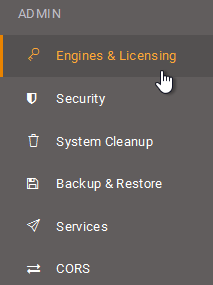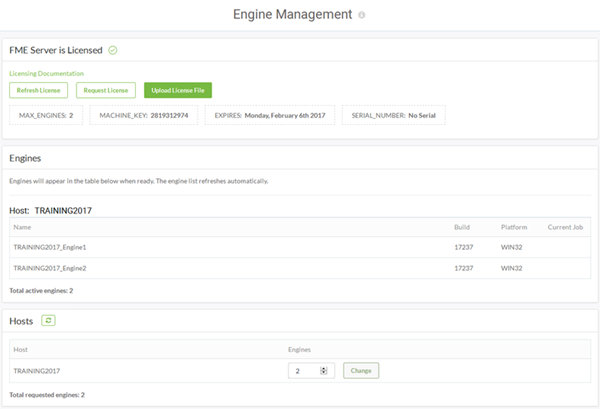Engines and Licensing
The first step in getting started on FME Server is to choose the menu option for Engines and Licensing:

This opens the Engine Management page, where you can ensure FME Server is running correctly, is licensed, and has active engines:

Licensing
The upper section of this page relates to licensing. The labels show how many engines are licensing, when the license expires, and what the machine key and serial number are. Buttons allow you to refresh the license, request a new one, or upload a license file.

Engines
The middle part shows the engines that are currently started, their FME build, operating system, and what job they are processing (if any). The platform is important because a distributed FME Server setup can have engines running on a variety of operating systems at the same time.

Hosts
The lower part of the page shows which engines are running on which host, and allows you to easily change the number of engines running, up to the maximum provided for by the current license:

If your FME Server is licensed, and has engines running that are assigned to the correct host, then you are ready to run a published workspace.
Job Queues
| .1 UPDATE |
| Job Queues are new for FME Server 2017.1! This feature replaces the Job Routing configurations. |
This section of the Engines & Licensing page, Job Queues, provides a way to reserve FME Engines for processing jobs from specific repositories. For example – you could have an FME Engine dedicated for processing quick tasks so that slower jobs will not cause a backlog. Similarly, you might reserve an FME Engine that sits on a more powerful machine for processing LiDAR data translations.

| Miss Vector says... |
|
Which of these are good reasons for running engines on multiple operating systems at the same time? Pick all that apply.
1. A required format is only available on 32-bit or 64-bit, not both. 2. A required format is only available on Windows, or Linux, not both. 3. FME Desktop users author workspaces using a mix of Windows, Linux, and Mac platforms. 4. You want to process heavy-scale jobs on a more powerful platform. |